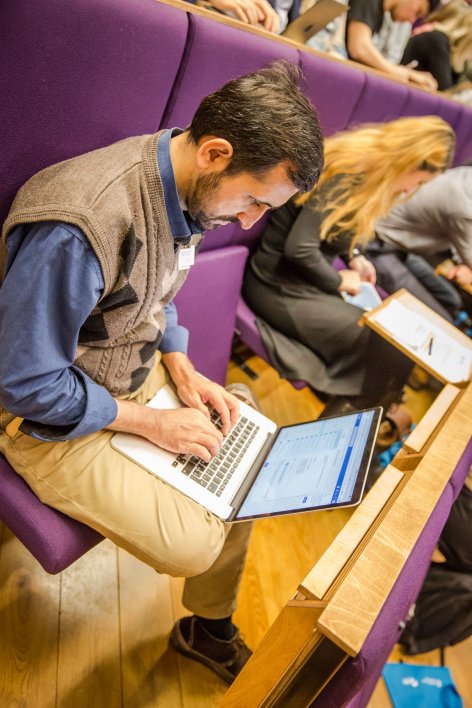Information Technology Systems Development
Professional higher education
1 May
1 June
18 July
1 September
If you want to do the work of the future and help find solutions to societal and economic problems, as well as to more general everyday concerns, come and study Information Technology Systems Development at Narva College. Professional higher education in this modern and rapidly developing field is versatile and exciting. Information and Communication Technology (ICT) education offers international job opportunities and ensures a secure future.
„The appeal of the IT specialisation at Narva College lies in the fact that the lecturers here are young, keeping up with the times, and understand that the IT world is evolving rapidly. This makes learning here more efficient and interesting than elsewhere.“


Our students prepare for a job in the modern ICT field, both as IT systems administrators and software developers. The theoretical knowledge gained in the three-year full-time study period is consolidated through the skills acquired in practice.
Alongside basic IT and economics skills, you will acquire programming skills as well as the ability to manage information systems and databases. We offer a wide range of e-courses and organise exciting study trips to prestigious Estonian ICT companies.
The instruction is conducted in three languages: Estonian, Russian, and English. You can master all three of them during your studies. Also, students usually complete the essential internship in enterprises.
To complete your studies, you have to write a thesis or pass a final exam.
We organise our studies in cooperation with the University of Tartu Institute of Computer Science.

Curriculum version:
More info: Study Information System
The University of Tartu Narva College is multicultural and international. The college has partners all over the world, and with their help, we can ensure internationally recognised learning.
You can have a voice in college life through the student council. Our students have excellent opportunities for personal development, as they can take part in and help organise a wide range of cultural and athletic events. For example, the college hosts horizon-widening lectures and meetings as well as club activities.
Mobility programmes allow you to study abroad. Find out more from our staff and students, many of whom are foreigners or have experience studying or working abroad.

Graduates of Narva College receive a professional higher education diploma from the University of Tartu.
Compared to other regions of Estonia, Ida-Virumaa has a relatively low entrepreneurial activity rate, which gives local specialists a great opportunity to succeed. Our graduates are welcomed by IT companies and other organisations needing IT specialists.
You also gain the necessary knowledge and skills to start your own business.
Graduates are welcome to continue their studies at the University of Tartu Institute of Computer Science and, for example, in the field of social sciences, including the Analysis of Society and Information Processes curriculum.
Admission requirements for Information Technology Systems Development
- secondary education – please see our country-specific document requirements
- Estonian language proficiency at B2 level (international applicants or applicants who have completed secondary education abroad and who do not have required Estonian skills must prove their knowledge of the Russian or Ukrainian language at least at the B2 level) – please see our language requirements
NB! The restrictions for the citizens of the Russian Federation are specified here.
Applications are evaluated based on
- the admission test (yields 50% of the final score) and
- the admission interview (yields 50% of the final score)
Entrance exams
Admission test
Admission test takes place:
- 7. July 2025 at 10:00 (local students) – Raekoja plats 2, Narva, Narva College (room 321)
- 8. July 2025 at 10:00 (international students) - the test will be held electronically (testid.ut.ee)
The admission test takes place in English or in Russian.
The admission test aims to evaluate the applicant's fit for the study programme. Applicants have to solve a multiple-choice test with calculation and logic tasks. You do not need a calculator to solve the test.
Evaluation criteria:
- understanding of IT-related concepts (max 35 points);
- logical reasoning skills (max 35 points);
- demonstration of mathematical thinking (max 30 points).
The total score is based on the test results, where all correct answers give the same number of points. A maximum of 100 points can be awarded for the test, and the minimum passing score is 51 points.
Admission interview
Admission interview takes place:
- 7. July 2025 at 12–17 (local students) – Raekoja plats 2, Narva, Narva College (rooms 303 and 306)
- 8. July 2025 at 12–17 (international students) – the interview will be held electronically in Zoom
The interview takes place in English or in Russian.
The duration of the interview is 15 min.
The interview aims to evaluate the applicant's:
- fit for the programme;
- motivation to study in the programme;
- communication and argumentation skills.
Topics and questions to be discussed in the interview:
- motivation for choosing the field of study;
- future plans related to the profession and the application of knowledge and skills;
- applicant's readiness for higher education studies (incl. study load, standard period of study, participation in mobility programmes);
- the ability to discuss and substantiate statements related to the field.
Evaluation criteria:
- The applicants assess their personal qualities, incl. previous study and work experience, abilities and interests, and explain how they can use them to their advantage in completing the studies (max 40 points).
- The applicants justify their interest in studying in this curriculum and demonstrate an understanding of the content of the curriculum (max 20 points).
- The applicants have a clear understanding of future job opportunities and give examples of specialisation in the long term, possible activities and positions. They also describe the possibilities for further study after completing the curriculum (max 20 points).
- The applicants understand the organisation of studies at the university and are able to assess their readiness for full-time study (in terms of time and financial resources). The applicants have considered the possible work- and/or personal life-related risks that may hinder the completion of the curriculum and how to mitigate them (max 10 points).
- The applicants know about student mobility opportunities in Estonia and abroad, both within the college and the university (max 10 points).
The applicant needs to receive at least 51 points for both the test and the interview. After the interview, the final admission score is calculated. To calculate the final admission score, each indicator is assessed and expressed in points. When ranking applicants, the score of the admission test (50%) and the score of the interview (50%) are taken into account. Applicants with a final admission score of 66 points or higher will be considered for the admission ranking. The maximum total score is 100 points.
For further information on assessing applicants' academic performance and calculating the admission score, see here.
How to apply
The following information applies to international students and Estonian students who graduated abroad.
The application system opens on 1 May and closes on 1 June. The following documents must be submitted electronically via DreamApply by the application deadline:
- Online application
- Official certified copy of the secondary school certificate and grade list in the original language (must include a description of the grading scale).
NB! Applicants from the member countries of EU, OECD, CIS (СНГ), Ukraine, Georgia, IB Diploma programme or graduating with A-level exams who are graduating in the upcoming spring/summer and having their secondary school certificate issued later than the application deadline should electronically submit their most recent grade list (grades for all your high school years up until the moment of application, including the grades/results for the last autumn semester) by the application deadline, 1 June. The grade list should be supplemented by an official statement from the issuing school indicating current enrolment and expected graduation date. Admitted candidates must post the certified copies of their graduation documents as soon as these have been issued (these must reach us by the end of July at the latest).
NB! Applicants from other countries can only apply if they have already obtained their final graduation documents and can submit these by the application deadline, 1 June. - Official certified translation of the secondary school certificate and grade list into English. We consider the following certified translations: 1) official translations made by the issuing institution (school, exam centre etc) bearing their original signature, stamp etc, or 2) translations certified by a sworn translator or notary.
- Proof of Estonian, Ukrainian or Russian language proficieny
- Copy of valid international passport page stating the applicant’s personal particulars
- Confirmation/receipt of application fee payment (if applicable). All international applicants are required to pay the application fee of EUR 100, unless they have Estonian citizenship and/or have completed their previous study level in Estonia. An application will only be processed after the UT has received the fee.
Submitted applications cannot be edited. It is only possible to upload new documents (e.g. graduation certificates). Applicants will receive feedback and notifications through the DreamApply system to their e-mail. Incomplete applications or those submitted by e-mail will not be considered for admission.
Applicants must send the application documents by post after receiving feedback that all application requirements are met. The documents should be posted to: Student Admissions, University of Tartu, Ülikooli 18-133, Tartu 50090, ESTONIA.
The documents must reach the university by 30 June. Only applicants whose application documents have reached the UT Student Admissions by the deadline can take the entrance examination. Applicants will be informed via DreamApply when their documents have arrived.
Requirements for educational documents
All copies of educational documents (secondary school certificate and grade list/transcript) must be officially certified. By certified, we mean that the copies should bear an original signature and seal of the authority certifying that these are true copies of the original document(s). The copies can be certified either 1) by an authorized official of the issuing institution, or 2) by a notary, or 3) with an Apostille attached. NB! Country-specific requirements may specify the way documents from certain countries must be certified. Please note that UT does not accept simple copies made based on already certified copies (primary copies are needed).
A ranking list will be formed based on the entrance examinations that take place in the beginning of July. Admission results will be announced to all applicants via DreamApply by 18 July at the latest. Admitted candidates are expected to accept or decline the offer in DreamApply in 2 days. If the decision is not communicated to UT via DreamApply by the stipulated deadline, UT reserves the right to withdraw the admission offer.
NB! It is not possible to postpone/defer the beginning of studies to the next academic year.
The official admission letter will be sent electronically via DreamApply to admitted students who have confirmed the offer.
NB! The electronic admission letter is also sufficient for non-EU students for applying for visa/residence permit in Estonian embassies.
Once the admission letter is issued, accepted students may proceed further with arranging their arrival. All non-EU students should first consult information on visa and temporary residence permit applications to be sure where and when the relevant documents need to be submitted.
NB! Please note that this programme is taught in our campus in Narva (184 km from Tartu).
Housing at the UT dormitory in Narva can be applied for a limited period in July after receiving the admissions offer.
Based upon common queries, the most important information has been summarised into a pre-arrival information website UT Getting Started.
Estonian applicants should apply via National Admission Information Systems (SAIS). Further information in Estonian is available here.






